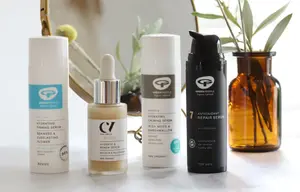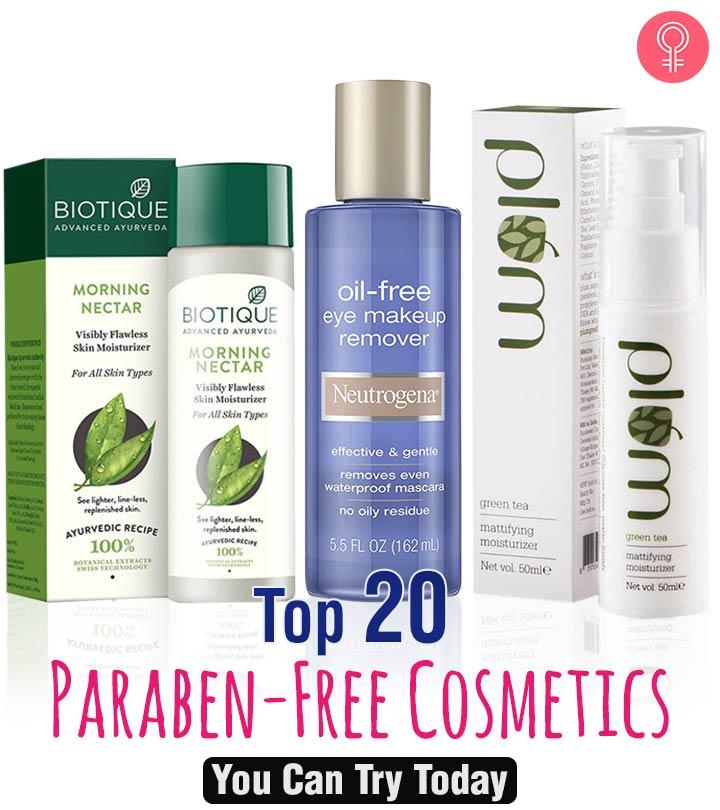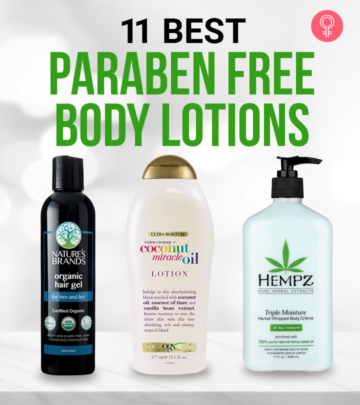Unveiling the Truth about Paraben-Free Products: A Journey Towards Safer Cosmetics
Paraben-free products refer to cosmetic, skincare, and personal care items that do not contain parabens, a type of synthetic preservative commonly used to prolong the shelf life of these products. Parabens have raised concerns due to their potential to mimic estrogen and disrupt the body's endocrine system, leading to worries about possible health risks. In response to consumer demand for safer alternatives, the beauty industry has seen a surge in the production of paraben-free products. These items are formulated without parabens, offering consumers a choice that aims to minimize exposure to potentially harmful chemicals, providing a more natural and health-conscious option for personal care routines.
Understanding Parabens.

In recent years, the beauty and personal care industry has undergone a significant transformation with a growing emphasis on the use of "paraben-free" products. Parabens, a type of preservative commonly found in cosmetics, skincare, and hair care items, have sparked concern due to their potential health risks. As a result, the market has witnessed a surge in the production and consumption of paraben-free alternatives. This article delves into the concept of parabens, their potential risks, the rise of paraben-free products, and their impact on the beauty industry and consumers.
Understanding Parabens
Parabens are a family of synthetic compounds used as preservatives in various personal care products to extend their shelf life by preventing the growth of bacteria and fungi. Common types of parabens include methylparaben, ethylparaben, propylparaben, and butylparaben. Their effectiveness, low cost, and ability to inhibit microbial growth made them a go-to choice for cosmetic manufacturers for decades.
However, concerns about the potential health risks associated with parabens have surfaced, particularly regarding their ability to mimic estrogen, a hormone that plays a crucial role in the body. Studies have shown that parabens can be absorbed through the skin and enter the body, where they may disrupt the endocrine system by imitating estrogen. This disruption has led to worries about potential links to hormone-related health issues, including breast cancer and reproductive problems.
The Rise of Paraben-Free Products
As consumers became more aware of the potential risks, the demand for paraben-free alternatives soared. This shift prompted many cosmetic companies to reformulate their products, excluding parabens from their ingredient lists. The market witnessed an influx of products labeled as "paraben-free," promoting themselves as a safer and healthier choice for consumers.
Consumers' growing concern about the ingredients in their beauty and personal care items has led to a greater emphasis on transparency from brands. Many individuals are now actively seeking products that not only avoid parabens but also steer clear of other potentially harmful substances, such as sulfates, phthalates, and formaldehyde-releasing agents.
Impact on the Beauty Industry and Consumers
The rise of paraben-free products has significantly impacted the beauty industry. Cosmetic companies have had to adapt to this consumer-driven demand, reformulating their products and investing in research and development to create safer alternatives without compromising effectiveness.
For consumers, the availability of paraben-free products provides peace of mind, knowing that they are making more informed and health-conscious choices. Individuals with sensitive skin or those who prefer natural, cleaner beauty options have benefited from the expansion of paraben-free ranges, as these products often contain fewer synthetic chemicals and focus on natural ingredients.
However, the shift towards paraben-free products has also raised challenges for both manufacturers and consumers. Formulating products without parabens while maintaining adequate preservation to prevent bacterial contamination is a technical hurdle for many companies. Consequently, the absence of parabens sometimes necessitates shorter shelf lives or alternative preservation methods, which can impact the overall product experience and cost.
Moreover, the term "paraben-free" has sometimes been used as a marketing strategy without full transparency. Some products might eliminate parabens but include other potentially harmful substances, leading to confusion among consumers. Therefore, it's essential for consumers to remain vigilant, educating themselves about various ingredients and relying on reliable sources for information.

Benefits of Paraben-Free Products
Paraben-free products offer several benefits, catering to the increasing consumer demand for safer and more natural alternatives in the beauty and personal care industry. Some of the advantages of using paraben-free products include:
- Reduced Health Concerns: Parabens have been associated with potential health risks, particularly their ability to mimic estrogen and potentially disrupt the endocrine system. Paraben-free products aim to minimize this risk, providing consumers with a safer option to avoid these potential health concerns.
- Minimized Skin Irritation: Parabens can sometimes cause skin irritation or allergic reactions, especially in individuals with sensitive skin. Paraben-free products are formulated without these preservatives, reducing the likelihood of skin irritation and making them suitable for a wider range of skin types.
- Environmentally Conscious: Some consumers opt for paraben-free products due to concerns about the environmental impact of these synthetic preservatives. Choosing paraben-free alternatives aligns with more environmentally friendly practices, supporting sustainability and reduced chemical exposure in ecosystems.
- Catering to Specific Preferences: Individuals who prefer more natural or clean beauty products often opt for paraben-free options. These products often contain fewer synthetic chemicals and focus on utilizing natural ingredients, catering to the preferences of those seeking a more holistic approach to their skincare and beauty routines.
- Increased Transparency and Awareness: The rise of paraben-free products has encouraged greater transparency within the beauty industry. Companies are more inclined to disclose their product ingredients, providing consumers with more information to make informed choices. This increased awareness contributes to a more educated and discerning consumer base.
- Potential Long-Term Health Benefits: While scientific research on the long-term effects of parabens is ongoing, opting for paraben-free products offers potential long-term health benefits by reducing exposure to these preservatives, potentially lowering the risk of associated health issues over time.
- Innovation and Formulation Diversity: The shift towards paraben-free products has spurred innovation in the beauty industry. Cosmetic companies have been prompted to explore alternative preservatives and formulation methods, leading to a wider array of product choices and formulation diversity for consumers.
Effects of Paraben-Free Products
The effects of paraben-free products primarily revolve around the absence of parabens and how their exclusion influences consumers, the beauty industry, and potential implications for personal health and the environment:
- Reduced Exposure to Potentially Harmful Chemicals: Paraben-free products aim to limit exposure to synthetic preservatives, potentially reducing the risk of certain health concerns associated with parabens, such as endocrine disruption and estrogenic activity.
- Skin and Allergy Benefits: Parabens have been known to cause skin irritation or allergic reactions in some individuals. Paraben-free products may mitigate these concerns, providing a gentler option for people with sensitive skin.
- Environmental Impact: While the direct effects of parabens on the environment are still under scrutiny, the absence of these preservatives in products contributes to a trend favoring more eco-friendly formulations. Choosing paraben-free options aligns with sustainable and environmentally conscious practices.
- Consumer Confidence and Transparency: The use of paraben-free labels emphasizes transparency within the beauty industry. Consumers are more informed about the absence of specific preservatives, promoting trust and confidence in the products they use.
- Innovation in Formulation: The movement towards paraben-free products has prompted cosmetic companies to explore and invest in alternative preservation methods and ingredients. This pursuit of innovation fosters new formulations, potentially leading to a broader range of product choices for consumers.
- Market Response and Demand: The increasing demand for paraben-free products has influenced the market and driven companies to adapt to consumer preferences. This shift has resulted in an expanding market segment focused on more natural and safer alternatives.
- Long-term Health Implications: While the long-term effects of parabens on health are still being researched, opting for paraben-free products potentially reduces exposure to these preservatives, which could have a positive impact on long-term health outcomes.
- Confusion and Misleading Marketing: Despite the benefits, the paraben-free movement has also led to confusion for consumers. Some products labeled as "paraben-free" might contain other preservatives or chemicals that pose similar concerns, which could mislead consumers looking for genuinely safer options.

Environmental Impact on Paraben-Free Products
The environmental impact of paraben-free products is a complex subject that involves various factors and considerations:
- Reduction in Chemical Discharge: Paraben-free products contribute to a decrease in the discharge of specific synthetic preservatives into the environment. Although the direct impact of parabens on ecosystems and aquatic life is still under investigation, reducing their presence minimizes the potential environmental burden.
- Water Quality and Ecological Impact: Parabens, when released into water bodies through product usage and wastewater, may have the potential to accumulate in the environment. This accumulation could affect aquatic organisms and ecosystems. The absence of parabens in products could contribute to preserving water quality and reducing potential ecological impacts.
- Sustainable Ingredient Sourcing: The push for paraben-free products often aligns with a broader movement towards sustainability and natural ingredients. This may encourage companies to seek more sustainable and responsibly sourced alternatives, potentially reducing environmental harm associated with raw material extraction or processing.
- Waste Disposal and Biodegradability: Some paraben-free products might utilize alternative preservatives or ingredients that are more easily biodegradable. This could lead to reduced environmental impact upon disposal, considering that these products break down more efficiently compared to synthetic chemicals.
- Consumer Awareness and Demand for Eco-Friendly Practices: The preference for paraben-free products often indicates a larger consumer demand for eco-friendly and clean beauty practices. This demand has the potential to influence manufacturers to adopt more environmentally conscious practices across their product lines.
- Industry Innovation and Sustainability: The pursuit of paraben-free formulations has encouraged innovation within the beauty industry, leading to the development of more sustainable, eco-friendly, and natural alternatives. This innovation has the potential to promote sustainable practices beyond merely the removal of parabens.
Frequently Asked Questions (FAQ)
What are the Products under Paraben-Free
A wide array of personal care and beauty products can be found in paraben-free formulations. These products encompass various categories to cater to different needs and preferences. Some of the common items available in paraben-free formulations include:
- Skincare Products:
- Facial cleansers
- Moisturizers
- Serums
- Sunscreens
- Face masks
- Eye creams
- Hair Care Products:
- Shampoos
- Conditioners
- Hair masks
- Styling products (gels, mousses, hair sprays)
- Body Care Products:
- Body lotions
- Body washes
- Body oils
- Deodorants
- Cosmetics:
- Foundations
- Concealers
- Lipsticks
- Eyeliners
- Eyeshadows
- Blushes
- Mascara
- Oral Care Products:
- Toothpaste
- Mouthwashes
- Men's Grooming Products:
- Shaving creams
- Aftershaves
- Face washes
- Baby and Kids' Products:
- Baby lotions
- Baby washes
- Diaper creams
- Kids' shampoos
- Fragrances:
- Perfumes
- Colognes
- Nail Care Products:
- Nail polishes
- Nail polish removers

How to Use Paraben-Free Products
Using paraben-free products is quite similar to using any other personal care or beauty items, but it involves a conscious choice to opt for formulations without synthetic preservatives. Here's a guide on how to use paraben-free products effectively:
- Read Labels and Understand Ingredients: Before purchasing, carefully read product labels to ensure they are marked as "paraben-free" or check the list of ingredients to confirm the absence of parabens. Familiarize yourself with common alternative preservatives or natural ingredients used in paraben-free formulations.
- Patch Test: If you have sensitive skin or allergies, conduct a patch test before using a new paraben-free product. Apply a small amount on a small area of skin and wait to check for any adverse reactions or irritations.
- Follow Usage Instructions: Use the product as instructed by the manufacturer. Different products may have varying application methods and usage frequencies, so adhering to the guidelines ensures optimal results.
- Switching Products Gradually: When transitioning to paraben-free alternatives, consider gradually introducing new products into your routine. Start with one product at a time, especially if you're completely changing your skincare regimen, to observe how your skin reacts and adapts.
- Store Products Properly: Proper storage helps maintain the efficacy and shelf life of paraben-free products. Keep them away from direct sunlight, excessive heat, or humidity as per the manufacturer's recommendations.
- Incorporate into Your Routine: Integrate paraben-free products into your regular skincare, hair care, and personal hygiene routines. Use them as replacements for your existing products to reap the benefits of reduced exposure to potentially harmful synthetic chemicals.
- Pair with Complementary Products: To optimize results, consider pairing paraben-free products that complement each other. For instance, using a paraben-free shampoo with a conditioner from the same line can enhance the effectiveness of both products.
- Monitor Results: Be attentive to how your skin or hair responds to the new paraben-free products. If you notice improvements or changes, such as reduced irritation or improved texture, it indicates the suitability of the products for your needs.
- Consult a Professional if Necessary: If you have specific skin concerns or allergies, consider consulting a dermatologist or healthcare professional for guidance on selecting the most suitable paraben-free products for your needs.
What products have no parabens?
Products without parabens include various personal care and beauty items from different categories. These can include paraben-free skincare products like facial cleansers, moisturizers, and serums; hair care products such as shampoos, conditioners, and styling products; body care items like lotions, body washes, and deodorants; cosmetics including foundations, lipsticks, mascaras, and eyeshadows; oral care products like toothpaste and mouthwashes; men's grooming products such as shaving creams and face washes; and even fragrances and nail care products.
What is another name for parabens?
Parabens can be found in product ingredient lists under various names. Some alternative names for parabens that consumers may encounter on product labels include:
- Methylparaben
- Ethylparaben
- Propylparaben
- Butylparaben
- Isobutylparaben
- Isopropylparaben
- Benzylparaben
- Heptylparaben
These variations indicate different types of parabens commonly used as preservatives in cosmetics, personal care products, and even some food items. Checking for these names on product labels can help identify if parabens are present in a particular item.

Which products contain parabens?
Parabens have historically been used as preservatives in a wide range of personal care and cosmetic products. While the use of parabens has decreased in recent years due to growing consumer concerns about their potential health effects, they might still be found in various items. Common products that might contain parabens include:
- Skincare Products: Face creams, lotions, moisturizers, and serums.
- Hair Care Products: Shampoos, conditioners, hair styling products, and treatments.
- Body Care Products: Body lotions, body washes, deodorants, and antiperspirants.
- Cosmetics: Foundations, concealers, eyeshadows, lipsticks, mascaras, and blushes.
- Oral Care Products: Toothpaste, mouthwashes, and dental care items.
- Shaving and Grooming Products: Shaving creams, aftershaves, and men's grooming items.
- Fragrances: Perfumes, colognes, and scented body products.
- Nail Care Products: Nail polishes, nail treatments, and removers.
It's important to note that the presence of parabens in these products can vary, and not all products within these categories necessarily contain parabens. Furthermore, the landscape of ingredient use is continuously evolving, with many brands opting for paraben-free formulations due to changing consumer preferences and concerns about potential health risks associated with these preservatives.
Consumers who wish to avoid parabens should carefully read product labels and consider choosing items explicitly labeled as "paraben-free" or ones that clearly specify the absence of parabens among their ingredients. Additionally, many natural or clean beauty brands have emerged, offering alternatives formulated without parabens.
Is paraben free a good thing?
The movement toward paraben-free products has been driven by growing consumer awareness and concern about potential health risks associated with these synthetic preservatives. While there isn't absolute consensus on the health risks posed by parabens, many individuals prefer to opt for paraben-free alternatives for several reasons:
- Reduced Health Concerns: Parabens have been shown in some studies to potentially mimic estrogen and disrupt the endocrine system. Concerns about their association with hormone disruption and their possible link to health issues, such as breast cancer and reproductive problems, have prompted many to seek paraben-free options to minimize exposure to these chemicals.
- Skin Sensitivities: Parabens can cause skin irritation or allergic reactions in some individuals, especially those with sensitive skin. Paraben-free products are often perceived as gentler and may be more suitable for people prone to skin issues.
- Environmental and Sustainability Considerations: Some consumers prefer paraben-free formulations due to concerns about the environmental impact of these synthetic preservatives. Choosing paraben-free options is seen as a step towards more environmentally conscious and sustainable beauty practices.
- Consumer Preference for Clean Beauty: The paraben-free trend aligns with the growing demand for cleaner, more natural beauty products. Consumers increasingly seek products that avoid certain synthetic chemicals, promoting a more natural and holistic approach to personal care.
- Innovation and Market Demand: The rise of paraben-free products has driven innovation within the beauty industry. Many brands have responded to consumer demands by formulating products without parabens, expanding the market for safer alternatives.
Ultimately, whether "paraben-free" is a good thing depends on an individual's concerns, preferences, and risk assessment. Some consumers feel more comfortable using products without parabens due to the potential risks associated with these preservatives, while others might be less concerned and continue using products with parabens. Making an informed choice based on personal health considerations and values is essential.

Reviews on Paraben-Free Products
Reviews on paraben-free products can vary based on individual experiences and preferences. Generally, many users who opt for paraben-free products have positive feedback, citing reasons such as reduced skin irritations, a perception of using "cleaner" or more natural products, and alignment with a more environmentally conscious lifestyle.
Positive Reviews:
- Gentler on Skin: Users often report fewer skin irritations or allergic reactions after switching to paraben-free products, particularly those with sensitive skin. This attribute is commonly appreciated among consumers.
- Perceived Safer Option: Many consumers believe that paraben-free products are a safer choice, especially considering concerns about potential health risks associated with parabens, such as hormone disruption.
- Environmental Consciousness: Some consumers appreciate the alignment of paraben-free products with a more eco-friendly and sustainable approach to personal care. Choosing these products contributes to a perception of supporting cleaner beauty practices.
However, some reviews might also highlight challenges or areas of improvement with paraben-free products:
Challenges:
- Shorter Shelf Life: Paraben-free formulations might have a shorter shelf life due to alternative preservatives or a lack thereof, which some users might find inconvenient.
- Product Efficacy: In certain cases, users may find that paraben-free alternatives are less effective in preventing microbial growth or might have different textures, scents, or consistencies compared to products with traditional preservatives.
- Misleading Marketing: Some users have expressed concern over misleading marketing, where products labeled as "paraben-free" might contain other potentially harmful ingredients, prompting confusion and distrust among consumers.
The quest for paraben-free products reflects a pivotal shift in the beauty and personal care industry towards safer, more natural alternatives. The concerns surrounding parabens have steered both consumers and cosmetic companies towards a more conscious approach to product formulation and consumption. However, while the movement toward paraben-free products signifies a positive step towards healthier choices, it's crucial for consumers to remain informed and discerning when selecting cosmetics and personal care items. With continued awareness and a focus on transparency, the beauty industry can continue to evolve, providing safer products that cater to the health and well-being of its consumers.



